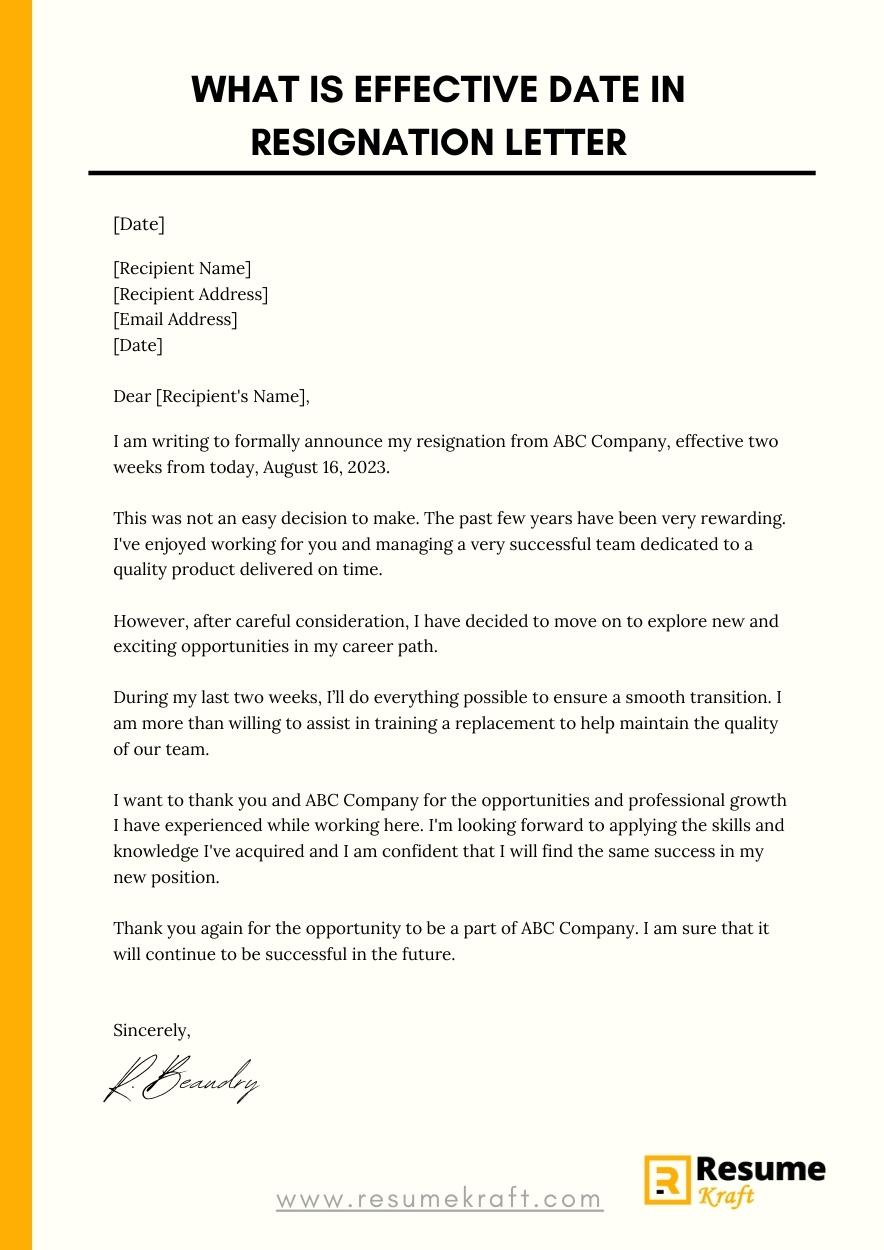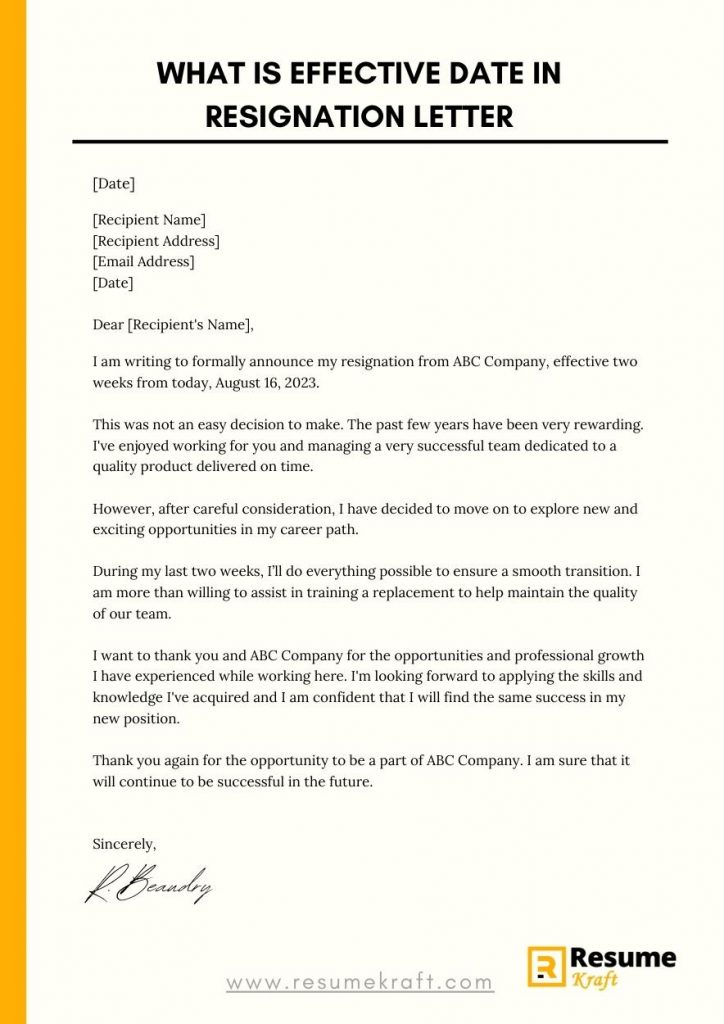
When it comes to resigning from a job, one crucial aspect that employees must consider is the effective date in their resignation letter. The effective date refers to the date on which the resignation takes effect and the employee’s employment with the company comes to an end. Setting an effective date is important for legal and practical reasons, ensuring a smooth transition for both the employee and the employer. In this article, we will explore the concept of the effective date in a resignation letter, its significance, and factors to consider when choosing the effective date.
Understanding the Effective Date
The effective date in a resignation letter refers to the date on which the resignation is intended to take effect. It is different from the resignation date, which is simply the date when the employee submits the resignation letter to their employer. The effective date is significant because it determines when the employment contract is terminated, and various legal and practical implications arise from this.
From a legal perspective, the effective date may be relevant for determining the notice period required by the employment contract or labor laws. It affects the employee’s entitlement to benefits, payment of salary, and other employment-related rights. The effective date also establishes the timeline for the employer to initiate the necessary procedures for finding a replacement and ensuring a smooth transition.
Factors to Consider When Choosing the Effective Date
Several factors should be considered when choosing the effective date for your resignation:
- Giving Sufficient Notice Period: Review your employment contract or company policies to determine the required notice period. Ensure that you provide adequate time for your employer to make necessary arrangements, such as finding a replacement or reallocating your responsibilities.
- Aligning with Company Policies and Employment Contract: Ensure that your chosen effective date aligns with any specific guidelines mentioned in your employment contract or company policies. This will help avoid any potential disputes or legal issues regarding the notice period.
- Impact on Benefits and Entitlements: Consider how the effective date will affect your entitlements, such as unused vacation days, insurance coverage, or stock options. Some companies may have specific regulations regarding benefits upon resignation, and aligning the effective date accordingly can help maximize your benefits.
- Handover of Responsibilities and Smooth Transition: If possible, select an effective date that allows you to hand over your responsibilities to a successor or provide appropriate transition support. This will ensure that your departure does not disrupt the workflow and allows your colleagues to adapt to the change smoothly.
- Personal Considerations: Personal factors, such as your start date at a new job or other commitments, should also be taken into account when choosing the effective date. Strive to find a balance between meeting your personal needs and professional obligations.
Crafting an Effective Resignation Letter
When drafting your resignation letter, ensure that it includes the chosen effective date clearly. Here are some key points to consider:
- Composing a Professional and Polite Tone: Maintain a professional tone throughout the letter. Express gratitude for the opportunities and experiences gained during your employment.
- Addressing the Recipient Appropriately: Begin the letter by addressing your immediate supervisor or the relevant person responsible for accepting resignations. Use their formal title if applicable.
- Clearly Stating the Intention to Resign: Clearly and unequivocally state your intention to resign from your current position. Mention the effective date in a separate paragraph to ensure clarity and avoid any confusion.
- Including the Chosen Effective Date: State the specific effective date in a concise and unambiguous manner. For example, “I hereby tender my resignation, effective [date], in accordance with the notice period specified in my employment contract.”
- Expressing Gratitude and Positive Closing Remarks: Conclude the resignation letter by expressing gratitude and appreciation for the opportunities provided, expressing well wishes for the company’s success.
Sample Scenarios and Examples
To further illustrate the different scenarios involving the effective date in a resignation letter, consider the following examples:

Dear Jane,
I am writing to formally announce my resignation from ABC Company, effective two weeks from today, August 16, 2023.
This was not an easy decision to make. The past few years have been very rewarding. I’ve enjoyed working for you and managing a very successful team dedicated to a quality product delivered on time.
However, after careful consideration, I have decided to move on to explore new and exciting opportunities in my career path.
During my last two weeks, I’ll do everything possible to ensure a smooth transition. I am more than willing to assist in training a replacement to help maintain the quality of our team.
I want to thank you and ABC Company for the opportunities and professional growth I have experienced while working here. I’m looking forward to applying the skills and knowledge I’ve acquired and I am confident that I will find the same success in my new position.
Thank you again for the opportunity to be a part of ABC Company. I am sure that it will continue to be successful in the future.
Sincerely, John Doe
Scenario 1: Resignation with a Short Notice Period
“Please accept my resignation, effective [date], as I have been offered an opportunity that aligns better with my long-term career goals. I understand that this is shorter notice than required, and I apologize for any inconvenience it may cause. I am committed to completing any pending tasks and handing over my responsibilities efficiently during this short transition period.”
Scenario 2: Resignation with a Longer Notice Period
“I am writing to inform you of my decision to resign from my position, effective [date]. I am providing a notice period of [number of weeks/months] as specified in my employment contract. I am committed to ensuring a smooth transition of my responsibilities and will cooperate fully during this period to facilitate the handover process.”
Scenario 3: Resignation to Start Immediately
“I regretfully tender my resignation with immediate effect. Due to unforeseen circumstances, I am unable to provide the notice period specified in my employment contract. I am ready to assist in any way possible to ensure a smooth transfer of my duties and responsibilities to a suitable replacement.”
Scenario 4: Resignation Due to Unforeseen Circumstances
“It is with regret that I tender my resignation, effective [date]. This decision is a result of unforeseen personal circumstances that require my immediate attention. I am grateful for the opportunities I have had and aim to complete any necessary handover tasks in the limited time available.”
Scenario 5: Resignation to Pursue Higher Education
“I am writing to inform you of my decision to resign from my current position, effective [date]. I have been accepted into a prestigious institution to pursue higher education, which requires my full-time commitment. I am willing to assist in any way possible during this period of transition.”
Frequently Asked Questions
It is best to discuss the situation with both your current and new employer. They may be able to work out a solution, such as adjusting the notice period or arranging for a temporary replacement.
In most cases, it is possible to negotiate a change to the effective date. However, this will depend on the willingness of both parties and any specific policies or regulations in place.
The effective date usually determines the expiration of your entitlement to benefits. Consult your employment contract, company policies, or speak with your HR department to understand how the effective date impacts your benefits.
It is generally advisable to inform your immediate supervisor or HR department about your plans before submitting the official resignation letter. However, depending on the circumstances, you may choose to keep the effective date more confidential until the appropriate time.
In certain situations, such as extreme misconduct or breach of contract by the employer, resigning with immediate effect may be warranted. However, it is generally best to provide a reasonable notice period to maintain professionalism and avoid burning bridges.
Conclusion
In the process of resigning from a job, setting the effective date in your resignation letter is crucial. It determines when your employment contract is terminated and can have legal and practical implications. By considering various factors such as notice period, company policies, benefits, and personal commitments, employees can navigate the effective date successfully. Crafting a comprehensive resignation letter that includes the chosen effective date ensures clarity and professionalism during this transition. Empowering employees with knowledge about the effective date empowers them to manage their resignation process smoothly and maintain positive relationships with their employers.

